Magellan

Editorial Pushkin Press
Fecha de edición enero 2010 · Edición nº 1
Idioma inglés
EAN 9781906548490
352 páginas
Libro
encuadernado en tapa blanda
Resumen del libro
The life of the great Portuguese explorer who dared to sail beyond the horizonThe Portuguese explorer Ferdinand Magellan (1480-1521) is one of the most famous navigators in history-he was the first man to sail from the Atlantic to the Pacific Ocean, and led the first voyage to circumnavigate the globe, although he was killed en route in a battle with natives in the Phillipines. In this biography, Zweig brings to life the Age of Discovery by telling the tale of one of the era's most daring adventurers. In typically flowing and elegant prose he takes us on a fascinating journey of discovery ourselves.
Stefan Zweig (1881-1942) was born in Vienna, into a wealthy Austrian-Jewish family. He studied in Berlin and Vienna and was first known as a poet and translator, then as a biographer. Zweig travelled widely, living in Salzburg between the wars, and was an international bestseller with a string of hugely popular novellas including Letter from an Unknown Woman, Amok and Fear.
In 1934, with the rise of Nazism, he moved to London, where he wrote his only novel Beware of Pity. He later moved on to Bath, taking British citizenship after the outbreak of the Second World War. With the fall of France in 1940 Zweig left Britain for New York, before settling in Brazil, where in 1942 he and his wife were found dead in an apparent double suicide.
Much of his work is available from Pushkin Press.
Biografía del autor
x{0026}lt;P x{0026}lt;B Stefan Zweigx{0026}lt;/B (Viena, 1881 x{0026} x02013; Petrópolis, 1942) fue un destacado escritor, biógrafo y ensayista austríaco, célebre por su estilo psicológico y humanista, que alcanzó una inmensa popularidad en las décadas de 1920 y 1930. Hijo de una familia judía acomodada, estudió filosofía y literatura en Viena, donde publicó sus primeros poemas y se relacionó con la élite cultural de su tiempo. Viajero incansable y firme pacifista, se opuso activamente a la Primera Guerra Mundial, lo que marcó profundamente su obra.x{0026}lt;/P x{0026}lt;P Autor prolífico en diversos géneros, escribió ficciones inolvidables como x{0026}lt;I Carta de una desconocidax{0026}lt;/I , x{0026}lt;I Amokx{0026}lt;/I , x{0026}lt;I La piedad peligrosax{0026}lt;/I y x{0026}lt;I Novela de ajedrezx{0026}lt;/I , así como estudios históricos y biografías literarias sobre figuras como Balzac, Dickens, Dostoyevski, María Antonieta y Fouché. Su obra x{0026}lt;I Momentos estelares de la humanidadx{0026}lt;/I es una de las más representativas de su talento narrativo y visión histórica.x{0026}lt;/P x{0026}lt;P Tras el auge del nazismo y la censura de sus escritos, Zweig se exilió sucesivamente en Inglaterra, Estados Unidos y Brasil. A pesar de su admiración por este último país, el desencanto ante el destino de Europa lo llevó a suicidarse junto a su esposa. Su autobiografía póstuma, x{0026}lt;I El mundo de ayerx{0026}lt;/I , es un emotivo testimonio de la cultura europea perdida. Su legado literario ha inspirado numerosas adaptaciones cinematográficas, incluida x{0026}lt;I El Gran Hotel Budapestx{0026}lt;/I de Wes Anderson, y sigue siendo valorado por su profundidad humanista y su mirada crítica ante los totalitarismos.x{0026}lt;/P








